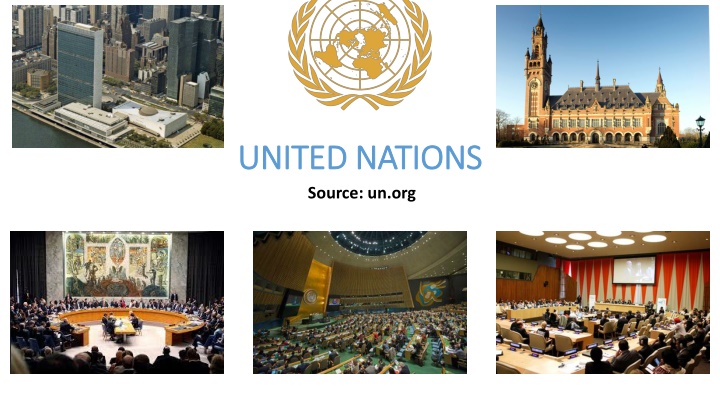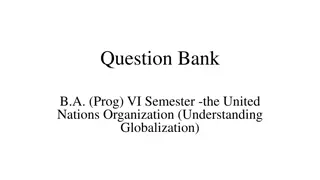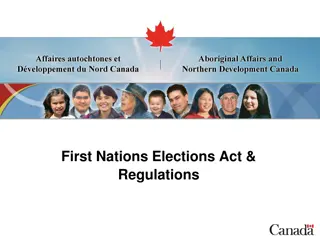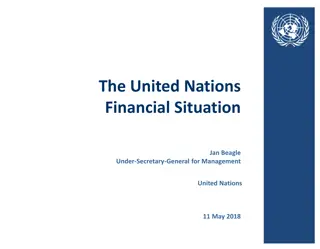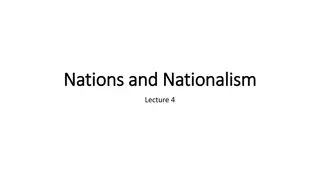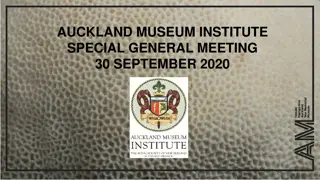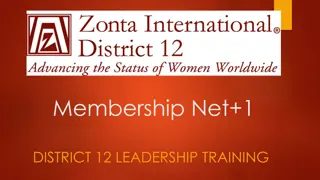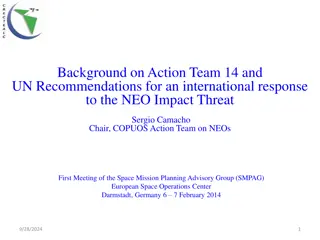Overview of the United Nations: Mission, Membership, and Impact
The United Nations, established in 1945 with headquarters in New York City, is an international organization comprising 193 Member States. Guided by its founding Charter, the UN addresses various global challenges such as peace, climate change, human rights, and more. Through its bodies and committees, it fosters dialogue, negotiation, and problem-solving among nations. The UN, celebrating its 75th anniversary in 2020, serves as a vital platform for collaboration and action on pressing issues facing humanity.
Download Presentation

Please find below an Image/Link to download the presentation.
The content on the website is provided AS IS for your information and personal use only. It may not be sold, licensed, or shared on other websites without obtaining consent from the author.If you encounter any issues during the download, it is possible that the publisher has removed the file from their server.
You are allowed to download the files provided on this website for personal or commercial use, subject to the condition that they are used lawfully. All files are the property of their respective owners.
The content on the website is provided AS IS for your information and personal use only. It may not be sold, licensed, or shared on other websites without obtaining consent from the author.
E N D
Presentation Transcript
UNITED NATIONS UNITED NATIONS Source: un.org
UN Overview UN Overview The United Nations, with headquarters in New York City, is an international organization founded in 1945. It is currently made up of 193 Member States. The mission and work of the United Nations are guided by the purposes and principles contained in its founding Charter. https://www.unmultimedia.org/avlibrary/asset/1288/1288630/ Due to the powers vested in its Charter and its unique international character, the United Nations can take action on the issues confronting humanity in the 21st century, such as peace and security, climate change, sustainable development, human rights, disarmament, terrorism, humanitarian and health emergencies, gender equality, governance, food production, and more. The UN also provides a forum for its members to express their views in the General Assembly, the Security Council, the Economic and Social Council, and other bodies and committees. By enabling dialogue between its members, and by hosting negotiations, the Organization has become a mechanism for governments to find areas of agreement and solve problems together. The UN's Chief Administrative Officer is the Secretary-General. 2020 marks the 75th anniversary of the United Nations. https://www.youtube.com/watch?v=gCOkMWv5TB0
UN Membership UN Membership from 51 to 193 from 51 to 193 1945, Original 51 Members: Argentina, Australia, Belgium, Bolivia, Brazil, Byelorussian Soviet Socialist Republic, Canada, Chile, China, Colombia, Costa Rica, Cuba, Czechoslovakia, Denmark, Dominican Republic, Ecuador, Egypt, El Salvador, Ethiopia, France, Greece, Guatemala, Haiti, Honduras, India, Iran, Iraq, Lebanon, Liberia, Luxembourg, Mexico, Netherlands, New Zealand, Nicaragua, Norway, Panama, Paraguay, Peru, Philippine Republic, Poland, Saudi Arabia, Syria, Turkey, Ukrainian Soviet Socialist Republic, Union of South Africa, Union of Soviet Socialist Republics, United Kingdom, United States, Uruguay, Venezuela, Yugoslavia 1946, 55: Afghanistan, Iceland, Siam, Sweden 1947, 57: Pakistan, Yemen 1948, 58: Burma 1949, 59: Israel 1950, 60: Indonesia 1955, 76: Albania, Austria, Bulgaria, Cambodia, Ceylon, Finland, Hungary, Ireland, Italy, Jordan, Laos, Libya, Nepal, Portugal, Romania, Spain 1956, 80: Japan, Morocco, Sudan, Tunisia 1957, 82: Ghana, Federation of Malaya 1958, 83: Guinea 1960, 99: Cameroun, Central African Republic, Chad, Congo (Brazzaville), Congo (Leopoldville), Cyprus, Dahomey, Gabon, Ivory Coast, Malagasy Republic, Mali, Niger, Nigeria, Senegal, Somalia, Togo, Upper Volta
UN Membership UN Membership from 51 to 193 from 51 to 193 1961, 104: Mauritania, Mongolia, Sierra Leone, Tanganyika 1962, 110: Algeria, Burundi, Jamaica, Rwanda, Trinidad and Tobago, Uganda 1963, 113: Kenya, Kuwait, Zanzibar 1964, 115: Malawi, Malta, Zambia 1965, 117: The Gambia, Maldive Islands, Singapore 1966, 122: Barbados, Botswana, Guyana, Lesotho 1967, 123: Yemen 1968, 126: Equatorial Guinea, Mauritius, Swaziland 1970, 127: Fiji 1971, 132: Bahrain, Bhutan, Oman, Qatar, United Arab Emirates 1973, 135: Bahamas, Federal Republic of Germany, German Democratic Republic 1974, 138: Bangladesh, Grenada, Guinea-Bissau 1975, 144: Cape Verde, Comoros, Mozambique, Papua New Guinea, Sao Tome and Principe, Suriname 1976, 147: Angola, Samoa, Seychelles 1977, 149: Djibouti, Viet Nam 1978, 151: Dominica, Solomon Islands 1979, 152: Saint Lucia 1980, 154: Saint Vincent and the Grenadines, Zimbabwe
UN Membership UN Membership 1981, 157: Antigua and Barbuda, Belize, Vanuatu 1983, 158: Saint Christopher and Nevis 1984, 159: Brunei Darussalam 1990, 159: Liechtenstein, Namibia 1991, 166: Democratic People's Republic of Korea, Estonia, Latvia, Lithuania, Marshall Islands, Federated States of Micronesia, Republic of Korea 1992, 179: Armenia, Azerbaijan, Bosnia and Herzegovina, Croatia, Georgia, Kazakhstan, Kyrgyzstan, Republic of Moldova, San Marino, Slovenia, Tajikistan, Turkmenistan, Uzbekistan 1993, 184: Andorra, Czech Republic, Eritrea, Monaco, Slovakia, The former Yugoslav Republic of Macedonia 1994, 185: Palau 1999, 188: Kiribati, Nauru, Tonga 2000, 189: Federal Republic of Yugoslavia, Tuvalu 2002, 191: Switzerland, Timor-Leste 2006, 192: Montenegro 2011, 193: South Sudan from 51 to 193 from 51 to 193
UN Charter UN Charter The Charter of the United Nations was signed on 26 June 1945, in San Francisco, at the conclusion of the United Nations Conference on International Organization. It came into force on 24 October 1945. The Statute of the International Court of Justice is an integral part of the Charter. Preamble Chapter I: Purposes and Principles Chapter II: Membership Chapter III: Organs Chapter IV: The General Assembly Chapter V: The Security Council Chapter VI: Pacific Settlement of Disputes Chapter VII: Action with Respect to Threats to the Peace, Breaches of the Peace and Acts of Aggression Chapter VIII: Regional Arrangements Chapter IX: International Economic and Social Co-operation Chapter XIX: Ratification and Signature
UN Charter UN Charter Chapter X: The Economic and Social Council Chapter XI: Declaration regarding Non-Self-Governing Territories Chapter XII: International Trusteeship System Chapter XIII: The Trusteeship Council Chapter XIV: The International Court of Justice Chapter XV: The Secretariat Chapter XVI: Miscellaneous Provisions Chapter XVII: Transitional Security Arrangements Chapter XVIII: Amendments
Preamble of the UN Charter Preamble of the UN Charter WE THE PEOPLES OF THE UNITED NATIONS DETERMINED to save succeeding generations from the scourge of war, which twice in our lifetime has brought untold sorrow to mankind, and to reaffirm faith in fundamental human rights, in the dignity and worth of the human person, in the equal rights of men and women and of nations large and small, and to establish conditions under which justice and respect for the obligations arising from treaties and other sources of international law can be maintained, and to promote social progress and better standards of life in larger freedom, AND FOR THESE ENDS to practice tolerance and live together in peace with one another as good neighbors, and to unite our strength to maintain international peace and security, and to ensure, by the acceptance of principles and the institution of methods, that armed force shall not be used, save in the common interest, and to employ international machinery for the promotion of the economic and social advancement of all peoples, HAVE RESOLVED TO COMBINE OUR EFFORTS TO ACCOMPLISH THESE AIMS Accordingly, our respective Governments, through representatives assembled in the city of San Francisco, who have exhibited their full powers found to be in good and due form, have agreed to the present Charter of the United Nations and do hereby establish an international organization to be known as the United Nations.
Purposes of the UN Purposes of the UN Article 1 The Purposes of the United Nations are: To maintain international peace and security, and to that end: to take effective collective measures for the prevention and removal of threats to the peace, and for the suppression of acts of aggression or other breaches of the peace, and to bring about by peaceful means, and in conformity with the principles of justice and international law, adjustment or settlement of international disputes or situations which might lead to a breach of the peace; To develop friendly relations among nations based on respect for the principle of equal rights and self-determination of peoples, and to take other appropriate measures to strengthen universal peace; To achieve international co-operation in solving international problems of an economic, social, cultural, or humanitarian character, and in promoting and encouraging respect for human rights and for fundamental freedoms for all without distinction as to race, sex, language, or religion; and To be a center for harmonizing the actions of nations in the attainment of these common ends.
Principles of the United Nations Principles of the United Nations Article 2 The Organization and its Members, in pursuit of the Purposes stated in Article 1, shall act in accordance with the following Principles. The Organization is based on the principle of the sovereign equality of all its Members. All Members, in order to ensure to all of them the rights and benefits resulting from membership, shall fulfill in good faith the obligations assumed by them in accordance with the present Charter. All Members shall settle their international disputes by peaceful means in such a manner that international peace and security, and justice, are not endangered. All Members shall refrain in their international relations from the threat or use of force against the territorial integrity or political independence of any state, or in any other manner inconsistent with the Purposes of the United Nations. All Members shall give the United Nations every assistance in any action it takes in accordance with the present Charter, and shall refrain from giving assistance to any state against which the United Nations is taking preventive or enforcement action. The Organization shall ensure that states which are not Members of the United Nations act in accordance with these Principles so far as may be necessary for the maintenance of international peace and security. Nothing contained in the present Charter shall authorize the United Nations to intervene in matters which are essentially within the domestic jurisdiction of any state or shall require the Members to submit such matters to settlement under the present Charter; but this principle shall not prejudice the application of enforcement measures under Chapter Vll.
Amendments to the UN Charter Amendments to the UN Charter Amendments to Articles 23, 27 and 61 of the Charter were adopted by the General Assembly on December 17, 1963 and came into force on 31 August 1965. A further amendment to Article 61 was adopted by the General Assembly on December 20, 1971, and came into force on September 24, 1973. An amendment to Article 109, adopted by the General Assembly on December 20, 1965, came into force on June 12, 1968. The amendment to Article 23 enlarges the membership of the Security Council from eleven to fifteen. The amended Article 27 provides that decisions of the Security Council on procedural matters shall be made by an affirmative vote of nine members (formerly seven) and on all other matters by an affirmative vote of nine members (formerly seven), including the concurring votes of the five permanent members of the Security Council. The amendment to Article 61, which entered into force on August 31, 1965, enlarged the membership of the Economic and Social Council from eighteen to twenty-seven. The subsequent amendment to that Article, which entered into force on September 24, 1973, further increased the membership of the Council from twenty-seven to fifty-four. The amendment to Article 109, which relates to the first paragraph of that Article, provides that a General Conference of Member States for the purpose of reviewing the Charter may be held at a date and place to be fixed by a two-thirds vote of the members of the General Assembly and by a vote of any nine members (formerly seven) of the Security Council. Paragraph 3 of Article 109, which deals with the consideration of a possible review conference during the tenth regular session of the General Assembly, has been retained in its original form in its reference to a "vote, of any seven members of the Security Council", the paragraph having been acted upon in 1955 by the General Assembly, at its tenth regular session, and by the Security Council.
Main Organs of the United Nations Main Organs of the United Nations Secretariat: The Secretariat, one of the main organs of the UN, is organized along departmental lines, with each department or office having a distinct area of action and responsibility. Offices and departments coordinate with each other to ensure cohesion as they carry out the daily work of the Organization in offices and duty stations around the world. At the head of the United Nations Secretariat is the Secretary-General. General Assembly: The General Assembly is made up of 193 Member States, after the admission of South Sudan on July 14, 2011 as the 193rd Member of the United Nations.
Main Organs of the United Nations Main Organs of the United Nations Security Council: The Security Council has 15 members. The United Nations Charter designates five Member States as permanent members and the General Assembly elects ten other members for two-year terms. The term of office for each non-permanent member of the Council ends on December 31 of the year indicated in parentheses next to its name. Five permanent members: China, France, Russian Federation, the United Kingdom, and the United States, and ten non-permanent members elected for two-year terms by the General Assembly (with end of term date): Belgium (2020), Dominican Republic (2020), Estonia (2021) Germany (2020), Indonesia (2020), Niger (2021) Saint Vincent and the Grenadines (2021), South Africa (2020), Tunisia (2021), Viet Nam (2021).
Main Organs of the United Nations Main Organs of the United Nations Economic and Social Council: The Economic and Social Council has 54 members, elected for three-year terms by the General Assembly. The term of office for each member expires on December 31 of the third year of service. Trusteeship Council: The Trusteeship Council is made up of the five permanent members of the Security Council - China, France, Russian Federation, United Kingdom and the United States. With the independence of Palau, the last remaining United Nations Trust Territory, the Council formally suspended operations on November 1, 1994. The Council amended its rules of procedure to drop the obligation to meet annually and agreed to meet as the occasion required, by its decision or the decision of its President or at the request of a majority of its members or the General Assembly or the Security Council. International Court of Justice: The International Court of Justice has 15 Judges, elected by both the General Assembly and the Security Council for nine-year terms. Current Members of International Court of Justice: Somalia, China, Japan, Slovakia, France, Morocco, Brazil, United States of America, Italy, Uganda, India, Jamaica, Australia, Russian Federation, Lebanon, Japan.
Secretaries General of the United Nations Secretaries General of the United Nations Ant nio Guterres, Portugal, 2017-Present Ban Ki-moon, Korea, 2007-2016 Kofi Annan, Ghana, 1997-2006 Boutros Boutros-Ghali, Egypt, 1992-1996 Javier Perez de Cuellar, Peru, 1982-1991 Kurt Waldheim, Austria, 1972-1981 U Thant, Myanmar, 1961-1971 Dag Hammarskj ld, Sweden, 1953-1961 Trygve Halvdan Lie, Norway, 1946-1952
Specialized Agencies of the United Nations Specialized Agencies of the United Nations 1. Food and Agriculture Organization (FAO) 2. International Civil Aviation Organization (ICAO) 3. International Fund for Agricultural Development (IFAD) 4. International Labor Organization (ILO) 5. International Maritime Organization (IMO) 6. International Monetary Fund (IMF) 7. International Telecommunication Union (ITU) 8. United Nations Educational, Scientific and Cultural Organization (UNESCO) 9. United Nations Industrial Development Organization (UNIDO) 10. Universal Postal Union (UPU) 11. World Bank Group (WBG): International Bank for Reconstruction and Development (IBRD), International Finance Corporation (IFC), International Development Association (IDA) 12. World Health Organization (WHO) 13. World Intellectual Property Organization (WIPO) 14. World Meteorological Organization (WMO) 15. World Tourism Organization (UNWTO)
UN Related Organizations UN Related Organizations Comprehensive Nuclear-Test-Ban Treaty Organization Preparatory Commission International Atomic Energy Agency (IAEA) International Organization for Migration (IOM) Organization for the Prohibition of Chemical Weapons World Trade Organization (WTO)
Millennium Development Goals Millennium Development Goals MDGs are eight goals with measurable targets and clear deadlines for improving the lives of the world's poorest people. To meet these goals and eradicate poverty, leaders of 189 countries signed the historic millennium declaration at the United Nations Millennium Summit in 2000. At that time, eight goals that range from providing universal primary education to avoiding child and maternal mortality were set with a target achievement date of 2015. The MDGs are interdependent; all the MDG influence health, and health influences all the MDGs. For example, better health enables children to learn and adults to earn. Gender equality is essential to the achievement of better health. Reducing poverty, hunger and environmental degradation positively influences, but also depends on, better health.
Eight Millennium Development Goals 2015 Eight Millennium Development Goals 2015 Eradicate extreme poverty and hunger; Achieve universal primary education; Promote gender equality and empower women; Reduce child mortality; Improve maternal health; Combat HIV/AIDS, malaria, and other diseases; Ensure environmental sustainability; and Develop a global partnership for development.
17 Sustainable Development Goals 17 Sustainable Development Goals for 2015 for 2015- -2030 2030 1. End poverty in all its forms everywhere 2. End hunger, achieve food security and improved nutrition, and promote sustainable agriculture 3. Ensure healthy lives and promote well-being for all at all ages 4. Ensure inclusive and equitable quality education and promote life-long learning opportunities for all 5. Achieve gender equality and empower all women and girls 6. Ensure availability and sustainable management of water and sanitation for all 7. Ensure access to affordable, reliable, sustainable, and modern energy for all 8. Promote sustained, inclusive and sustainable economic growth, full and productive employment and decent work for all 9. Build resilient infrastructure, promote inclusive and sustainable industrialization and foster innovation 10. Reduce inequality within and among countries
17 Sustainable Development Goals 17 Sustainable Development Goals for 2015 for 2015- -2030 2030 11. Make cities and human settlements inclusive, safe, resilient and sustainable 12. Ensure sustainable consumption and production patterns 13. Take urgent action to combat climate change and its impacts (in line with the United Nations Framework Convention on Climate Change) 14. Conserve and sustainably use the oceans, seas and marine resources for sustainable development 15. Protect, restore and promote sustainable use of terrestrial ecosystems, sustainably manage forests, combat desertification, and halt and reverse land degradation and halt biodiversity loss 16. Promote peaceful and inclusive societies for sustainable development, provide access to justice for all and build effective, accountable and inclusive institutions at all levels 17. Strengthen the means of implementation and revitalize the global partnership for sustainable development
